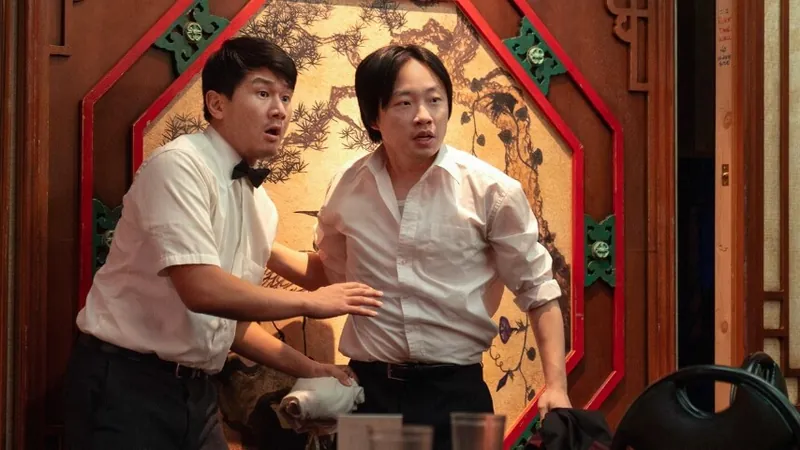
Hulu's Interior Chinatown: A Campy Yet Heartfelt Exploration of Identity in a Stereotypical World
2024-11-15
Author: Jia
Hulu's adaptation of Charles Yu's acclaimed 2020 novel *Interior Chinatown* brings an intriguing mix of camp and charm to the screen, albeit with its own set of challenges. Yu's original work delves deep into the identity struggles faced by an Asian man who yearns to rise above his role as a background actor in a cop show and instead be celebrated as a Kung Fu star. The story takes a gripping turn when he experiences personal loss, leading him to a profound realization about the significance of his culture and community. While the show may not fully capture the novel's biting wit, it stands out as a unique and enjoyable offering in its own right.
The series, with Yu also serving as the showrunner, takes creative liberties with the narrative. However, it successfully reimagines his innovative screenplay structure, transforming it into a visually stimulating experience. The first episode, directed by Taika Waititi, sets a whimsical tone with dynamic lighting, immersive soundscapes, and creatively shifting camera angles that reflect the protagonist's perspective. The production design magnificently contrasts the vibrant life of Willis Wu, portrayed by Jimmy O. Yang, against the mundane existence he feels trapped within, effectively posing the question: How does one become the hero of their own narrative?
From the outset, Willis is depicted as a downtrodden character grappling with the pain of his brother’s disappearance. Living in the shadow of his family’s grief, he finds himself trapped in his uncle's Chinese restaurant, yearning for something more significant in life. This yearning intensifies when he witnesses a potential abduction, igniting a determination within him to uncover the mystery behind his brother's vanishing. What follows is an investigation that catalyzes Willis’s transformation from an invisible figure into a courageous leader.
The character's evolution is not instantaneous. Willis grapples with the tension between the safety of his routine and the risks that could potentially upend his family's lives. Yang beautifully captures his character’s blend of innocent ambition and cautious hope, showcasing a dynamic range from humor to heartfelt determination. Known for his performances in *Silicon Valley* and *Crazy Rich Asians*, Yang seizes the opportunity in *Interior Chinatown* to reveal greater depths of his talent.
In a humorous twist, Willis adapts different personas—such as “Tech Guy” and “Delivery Guy”—to better integrate into the precinct and gather evidence. This approach serves as a comic critique of Hollywood's reductive portrayals of minorities. In a particularly funny moment, Willis becomes adept at manipulating crime-scene technology merely by wearing glasses, offering a lighthearted jab at genre stereotypes. However, the show tends to paint its critique of Asian representation in broad strokes rather than the nuanced, incisive commentary found in the novel.
Unlike the book, the television adaptation falls short in delivering deep critiques regarding Asian representation, leaning instead heavily into a parody of classic law enforcement dramas like *Law & Order: SVU*. The plot pivots towards the suspense-filled narrative set in Chinatown, encapsulating elements such as organized crime and police corruption. The addition of key characters, like Lana Lee, played by Chloe Bennet, shifts the focus back to genuine character connections, with Lana exhibiting her own struggles as she seeks recognition in a male-dominated workplace.
Lana, much like Willis, embodies the spirit of the underdog—an ambitious detective overlooked by her colleagues due to systemic racism. Together, she and Willis embark on a quest to solve the mystery of his brother, uniting their strengths in an engaging storyline filled with mutual growth. Comedian Ronny Chieng lightens the mood with his performance as Willis's best friend, whose viral antics bring comedic relief.
Even though the first few episodes are still honing the show's narrative voice, there is much to appreciate in its exploration of identity, community, and the fight against pigeonholing. The surreal aspect of the storytelling, such as the rapid transitions from day to night and the vibrant transformation of Chinatown when Willis embraces his identity, enriches the viewing experience. Ultimately, *Interior Chinatown* succeeds not just as a fantasy but as a deeply authentic character study, resonating with anyone who has ever sought to step out of the shadows into the light of self-acceptance.
Get ready to root for Willis Wu as he strives to claim his place in a world that too often tries to sideline him—who knows what adventures await in the heart of *Interior Chinatown*!




 Brasil (PT)
Brasil (PT)
 Canada (EN)
Canada (EN)
 Chile (ES)
Chile (ES)
 España (ES)
España (ES)
 France (FR)
France (FR)
 Hong Kong (EN)
Hong Kong (EN)
 Italia (IT)
Italia (IT)
 日本 (JA)
日本 (JA)
 Magyarország (HU)
Magyarország (HU)
 Norge (NO)
Norge (NO)
 Polska (PL)
Polska (PL)
 Schweiz (DE)
Schweiz (DE)
 Singapore (EN)
Singapore (EN)
 Sverige (SV)
Sverige (SV)
 Suomi (FI)
Suomi (FI)
 Türkiye (TR)
Türkiye (TR)